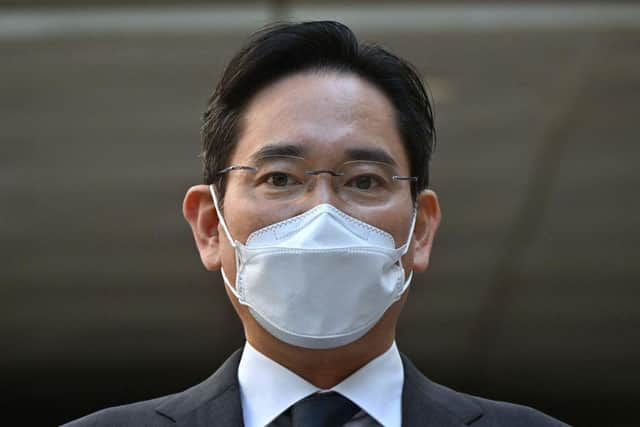Who is Lee Jae-yong, the Samsung heir jailed twice for bribing a former president in a scandal involving a ‘Korean Rasputin’?
Now Samsung Electronics has named as chairman the heir to the family dynasty – who has been jailed twice in a bribery scandal that led to the downfall of the South Korean president.
Lee Jae-yong – known in the West as Jay Y Lee – has essentially run the company since his father, Lee Kun-hee, fell ill in 2014. Mr Lee died in 2020.
Advertisement
Hide AdAdvertisement
Hide AdHowever, Mr Lee Junior, who dropped out of a doctorate programme at Harvard Business School in the US, before joining the Samsung corporation in 1991, became caught up in a scandal that rocked the business and political communities of South Korea.


He was convicted of bribery and embezzlement in 2017, but was granted a special presidential pardon in August last year and was released from jail after serving 207 days behind bars – half of the sentence he had ultimately been given.
South Korea’s Justice Ministry said it made the decision to release Mr Lee for economic reasons – after considering the effects of the pandemic on South Korea's economy and global markets, following lobbying from the US Chambers of Commerce.
In a statement, then-President Moon Jae-in's office said Mr Lee’s release was made in the national interest and asked for understanding.
"We are well aware that there are supporting and opposing views on vice-chairman Jay Y Lee's parole,” the statement said. “The views of the people who are opposed are also right.”
He was formally pardoned by new President Yoon Suk-yeol this year.
The scandal, which became public in 2016, involved Choi Soon-sil, the daughter of a Shamen-esque cult leader Choi Tae-min, who was described by US diplomatic officials as a "Korean Rasputin" – referencing the Russian mystic who befriended the family of Nicholas II, the last Emperor of Russia. The Choi family, through Ms Choi, were believed to have had undue influence over then-president Park Geun-hye, who had known the Choi family for more than 30 years.
It is understood Ms Park had first met Ms Choi in 1974, when her father offered to counsel and advise the Park family, who were grieving after the assassination of Ms Park's mother, then-first lady Yuk Young-soo.
Advertisement
Hide AdAdvertisement
Hide AdThe bribery scandal saw a court rule that President Park had abused her power and was unduly influenced by Ms Choi, who allegedly had access to the president’s schedule, influenced her choice of clothes and personnel decisions, and even had access to classified meetings with North Korea.
Mr Lee’s involvement came when he was charged with offering $38 million [£33m] in bribes to four companies controlled by a friend of then-President Park Geun-hye, including a company in Germany set up to support equestrian training for Ms Choi. Prosecutors alleged the bribes were offered in exchange for government help with a merger that strengthened Mr Lee’s control over Samsung at a crucial time for organising a “smooth leadership transition” after his father fell ill.
Mr Lee was found guilty on each charge by a three-judge panel of Seoul Central District Court in August 2017 and was sentenced to five years in prison. The Supreme Court eventually ordered a retrial, which saw him sentenced to two years and six months in prison by Seoul High Court, which found him "guilty of bribery, embezzlement and concealment of criminal proceeds" worth around £5.75m. It also found Samsung's independent compliance committee, established in 2020, was not yet fully effective.
The decision for the board to appoint Mr Lee as chairman formalised an arrangement that had been in place for months. In 2020, following the death of his father, Mr Lee declared an end to dynastic control of South Korea's largest business conglomerate, meaning he is the last member of the family in the line of succession. He has two children, aged 25 and 18, from his marriage to ex-wife Lim Se-ryong.
His troubles did not end there. Last year, Mr Lee was convicted for illegally using the drug propofol multiple times between 2015 and 2020 and was ordered to pay a fine worth more than £50m.
Sentencing him, the judge gave Mr Lee a rap on the knuckles, referencing his family. "Show an exemplary model to your children whom they won't be ashamed of," the judge told South Korea’s second richest man.
However, Mr Lee’s wrangle with the law is still ongoing.
A throwaway line in an article in the Korea Herald announcing his appointment as chairman perhaps illustrates the unusual nature of the situation.
"’I'm taking on a huge responsibility,’ Mr Lee told reporters while attending a trial Thursday,” the newspaper said.
Advertisement
Hide AdAdvertisement
Hide AdThe fact reporters are conducting interviews over his senior appointment while the businessman is at a court – himself on trial – is telling. Mr Lee is in court – again – for allegedly violating the Capital Market Financial Investment Business Act in connection with Samsung C&T's merger with Cheil Industries.
Although his promotion suggests a formal step up in terms of his involvement, he is not yet a controlling shareholder of the tech giant.
Personally, Mr Lee holds just 1.63 per cent voting rights in Samsung Electronics. However, holding company Samsung C&T holds a 5.01 per cent stake, while Samsung Life Insurance, in which Samsung C&T and Mr Lee own a combined 30 per cent stake, has nearly 9 per cent of the voting rights for Samsung Electronics.
He has ambitious plans for the company, saying in a briefing message to staff it is time to be “daring and defiant”.
"Futuristic technology will determine our fate – we need to invest in technologies that are not of today," he said.
Comments
Want to join the conversation? Please or to comment on this article.